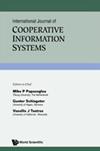GDASC:基于模糊系统理论的IPE课程实践教学模式结构
IF 0.8
4区 计算机科学
Q4 COMPUTER SCIENCE, INFORMATION SYSTEMS
International Journal of Cooperative Information Systems
Pub Date : 2023-06-16
DOI:10.1142/s0218843023500156
引用次数: 0
摘要
本文章由计算机程序翻译,如有差异,请以英文原文为准。
GDASC: Practical teaching mode structure for IPE course based on fuzzy system theory
求助全文
通过发布文献求助,成功后即可免费获取论文全文。
去求助
来源期刊

International Journal of Cooperative Information Systems
工程技术-计算机:信息系统
CiteScore
2.30
自引率
0.00%
发文量
8
审稿时长
>12 weeks
期刊介绍:
The paradigm for the next generation of information systems (ISs) will involve large numbers of ISs distributed over large, complex computer/communication networks. Such ISs will manage or have access to large amounts of information and computing services and will interoperate as required. These support individual or collaborative human work. Communication among component systems will be done using protocols that range from conventional ones to those based on distributed AI. We call such next generation ISs Cooperative Information Systems (CIS).
The International Journal of Cooperative Information Systems (IJCIS) addresses the intricacies of cooperative work in the framework of distributed interoperable information systems. It provides a forum for the presentation and dissemination of research covering all aspects of CIS design, requirements, functionality, implementation, deployment, and evolution.
 求助内容:
求助内容: 应助结果提醒方式:
应助结果提醒方式:


